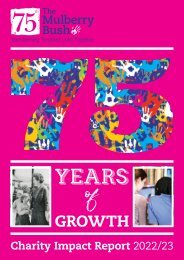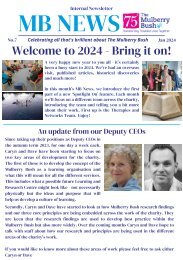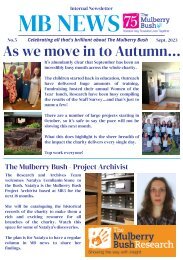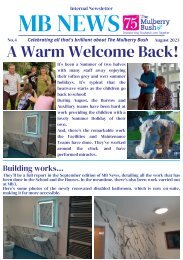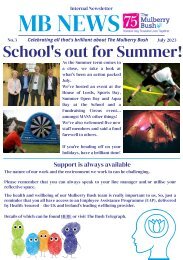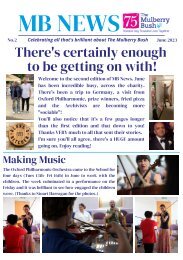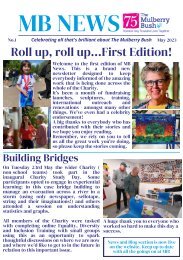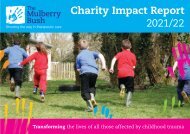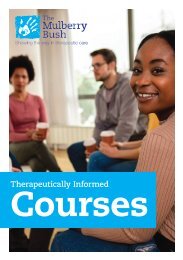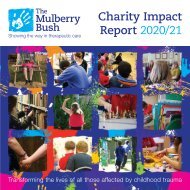MBO Impact Report 2019
Create successful ePaper yourself
Turn your PDF publications into a flip-book with our unique Google optimized e-Paper software.
Support: Our Research
The Mulberry Bush School
is committed to research
in therapeutic residential
and foster care.
It aims to develop and
shape a research culture
to influence practice within
The Mulberry Bush and
other schools, agencies
and providers of care to
vulnerable, traumatised
children and their families.
We collaborate with
researchers in academic
and other childcare settings.
The following are some
examples of current projects:
success rate
of improving
children’s ability
to resolve trauma
1
University of Sussex 2013-ongoing
Development of The SEA Scale
The SEA Scale (Social & Emotional Adjustment Scale) is due for virtual
launch in 2020. We are recruiting a group of early adopters.
It is a brief 25 item questionnaire measuring the socio-emotional abilities of
children aged 5-13. Initially devised by a multidisciplinary group of Mulberry
Bush practitioners because none of the existing measures adequately
considered the social and emotional aspects which are central to the
work at The Mulberry Bush.
Professor Robin Banerjee,
Jasmine Williamson and
Dr Helen Drew from the
University of Sussex helped
create the SEA Scale and
gathered the initial data.
2
Dave Roberts 2013-2020
Qualitative, exploration of the ‘therapeutic approach’ – case study
• Parents and carers are often unclear about the therapeutic nature of the
school, and how this can be maintained at home.
• The Mulberry Bush therapeutic environment positively affects children’s
ability to understand their feelings.
• Group-work model poorly understood by children, staff and parents
3
UEL Research Team 2017-2020 draft findings
Reflective practice
The reflective practice culture (RPC) emerges as distinctively
psychodynamic and systemic. It creates and sustains a zone of tolerable
receptivity to the children’s problematic behaviours and feelings,
so that both children and staff can remain optimally psychologically
safe to engage together in the therapeutic task.
4
Dr Steve Farnfield 2017-2020
Attachment, trauma and play
Quote from The Mulberry Bush Story Stem Research:
‘In attachment terms, this is an extremely distressed population of
children...but The Mulberry Bush can claim a 72% success rate in terms
of improving children’s ability to resolve trauma and loss, to improve the
quality and coherence of their play as well as their attachment security.’
Further findings suggest that:
• Helping children with the impact of the loss of family must be
thoroughly incorporated into the work in all areas of their lives.
• At The Mulberry Bush children diagnosed with autistic spectrum
condition are amenable to changes in their attachment style.
5 Retrospective
study of ex-pupils
Mixed methods – pilot stage
2018-ongoing
Discussions are taking
place with a potential
university partner for this
exciting study looking at the
life experiences of ex-pupils.
Funding is being sought
and ideas gathered for the
study design.
The image to the left was
produced by Scriberia during
a conference in September
2019 entitled Trauma Informed
Practice: What works
with children and families.
The presentation was called
Bringing alive the minds of
traumatised children: practice
and research.
The conference was co-organised
by The International Centre
for Therapeutic Care,
Family for Every Child and
The Institute of Recovery
from Childhood Trauma.
16



